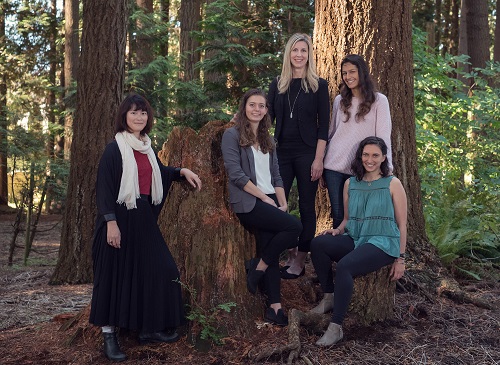
Ambassadors for Elephants
This past August, four UBC undergraduate students took part in a new field study program on Asian Elephant Compassionate Conservation in Thailand (LFS 302D). The goal of the program was to explore how the science of animal well-being can be used in conservation to improve outcomes for animals, people and the environment.
For four weeks, Maria Chen, Maya Weston, Laurelie Menelon (all in the Applied Animal Biology program), and Mikaela Gerwing (in the Natural Resources Conservation program in the Faculty of Forestry) were welcomed into the homes of local families in the remote village of Huay Pakoot, in northern Thailand. They participated in an on-going research program with the Mahouts Elephant Foundation (MEF), in collaboration with the Institute for Compassionate Conservation, that is studying the behavior, social dynamics, bioacoustics and food ecology of a group of re-wild elephants.
“The elephant tourism industry in southeast Asia draws people into having experiences with them that are often harmful to the animal, in a way that is not always evident to the tourist,” said Chen. “The habitat created by the Mahouts Elephant Foundation provides for an eco-centric relationship between us and the animals.”
Elephants in the tourism industry can be forced into activities such as giving tourists rides on their backs or painting with their trunks, which can be detrimental to their welfare.
The field course works collaboratively with the MEF, a UK-based charity (mahouts.co.uk). MEF is dedicated to improving and protecting the lives of Asian elephants, who have often been forced into the tourism industry, by re-introducing them into a conserved natural habitat.
The habitat, which currently houses four elephants, is 3200 hectares of forest and mountainous terrain. Since it would be impossible to have fully wild elephants in Thailand today, MEF is working toward a competing model of ecotourism, which includes an autonomous life for the elephants while still being watched over by traditional elephant keepers or guardians, called mahouts. This allows for a sustainable, welfare-focused tourist experience that supports the livelihoods of mahouts and the community, while also providing a sanctuary for the elephants.
Each student was responsible for conducting research projects focused on an individual topic of interest:
- Maria looked at the relationship between mahouts and their elephant(s). Mahout-elephant relationships are formed over many years and with only one mahout at a time.
- Maya looked at juvenile play behavior, between the youngest elephant in the herd, Sunti, and the other elephants, as well as with the mahouts. Sunti is the first and only elephant to be born in the MEF habitat.
- Laurelie looked at the foraging behavior of the elephants, such as food harvesting, food processing, and how much time the elephants spent looking for food.
- Mikaela looked at object manipulation by the elephants, in relation to food processing, grooming, and movement, by observing different occurrences and trends among individuals.
Data collection for their project involved long hikes into pristine bamboo and tropical evergreen forests, assisting traditional mahouts, assessing forest habitats and surveying other wildlife.
In addition to their course-related activities, the students participated in local activities such as rice planting, foraging, language lessons, and fabric and basket weaving.
Kristen Walker, an instructor in Applied Biology and for this field course, is looking forward to the growth of this program. “This is a unique hands-on opportunity for UBC students to be a part of an immersive learning experience in the field of compassionate conservation.”
Since their return to UBC, the students have been presenting the findings of their research to their peers within the Faculty, and encouraging different discussions on animal welfare.